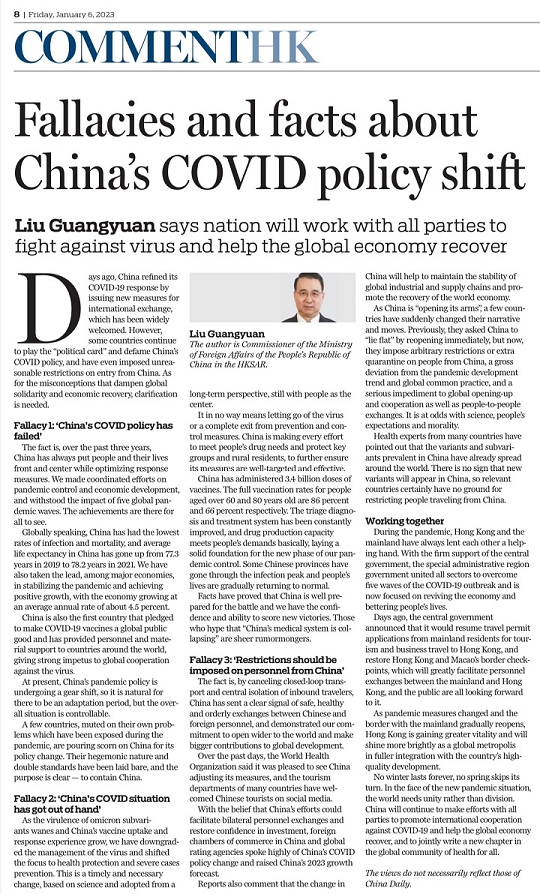2023年1月6日,刘光源特派员在《中国日报(香港版)》发表题为《中国科学精准优化防疫政策不容歪曲》的英文署名文章,阐述中国因时因势优化防疫政策的科学性、必要性、及时性,以事实和数据驳斥个别外部势力关于“中国防疫失败论”“中国疫情失控论”“对华入境设限论”三大谬论,展望香港在与内地有序“通关”进程中展现国际大都市的更大魅力。文章同日亦在该报网页版刊登。全文如下:

中国科学精准优化防疫政策不容歪曲
近来,中国平稳有序推进防疫政策调整转段,发布中外人员往来暂行措施,得到国际社会普遍欢迎。但个别势力顽固借疫情打“政治牌”,炮制各种歪理谬论抹黑中国防疫政策,甚至对华人员无理设限,干扰全球团结抗疫和世界经济复苏。对此有必要澄清是非、去伪存真。
“中国防疫失败论”?新冠疫情三年来,中国始终坚持人民至上、生命至上,因时因势优化调整防疫措施,高效统筹疫情防控和经济社会发展,成功应对全球五波疫情冲击,优异“成绩单”有目共睹。中国疫情流行和病亡数保持在全球最低水平,人均预期寿命由2019年的77.3岁提高到2021年的78.2岁,在全球主要经济体中率先稳控疫情并实现正增长,保持4.5%左右的年均增幅。中国还率先提出将疫苗作为国际公共产品,并向多国提供人员和物资支援,为全球抗疫合作注入强劲动力。当前中国防疫政策正经历“换挡”,不可避免会有一个适应期,疫情形势发展总体在预期和可控之中。个别国家无视自身在疫情中暴露的种种问题,却自始至终对中国抗疫政策指手画脚、污蔑抹黑,充斥霸权逻辑和双重标准,“以疫遏华”的政治算盘昭然若揭。
“中国疫情失控论”?随着奥密克戎变异株致病力减弱和中国疫苗接种普及、防控经验积累,中方将新冠病毒感染从“乙类甲管”调整为“乙类乙管”,工作重心转向保健康、防重症,这是科学防控的及时必要之举,也是践行“以人民为中心”的战略长远之策。但放松并非放任,“乙管”并非“不管”。中国正全力保障群众用药需求、做好重点人群防护救治、加强农村地区疫情防控,不断提升防控工作科学性、精准性、有效性。当前全国接种疫苗累计超34亿剂次,60岁以上及80岁以上老年人全程接种率分别超86%和66%,分级诊疗救治体系不断完善,药品产能基本满足市场需求,为疫情防控步入新阶段打下坚实“地基”。部分省市已渡过措施调整后的疫情高峰,生产生活正逐步恢复正常。事实证明,中方打的是有准备之仗,有信心有能力取得疫情防控新的胜利,那些质疑中国“防疫体系崩溃”的论调纯属无稽之谈。
“对华入境设限论”?中国秉持科学态度,稳慎取消对入境人员闭环转运、集中隔离等措施,释放了推动中外人员安全健康有序往来的明确信号,彰显了坚定扩大对外开放、为全球发展继续作出更大贡献的大国担当。连日来,世卫组织表示乐见中国调整防疫措施,多国旅游部门在社交媒体发帖欢迎中国游客往访,外国在华商会和评级机构纷纷肯定中国便利双边人员往来、重振投资营商信心的努力,大幅上调今年中国经济增长预期。分析认为中国优化防疫政策有助于维护全球产业链供应链稳定,促进世界经济复苏。就在中国“张开双臂”之际,个别国家却忘记此前不管不顾要求中方“躺平”“放开”的论调,迅速“变脸”,甚至蛮横对自华入境人员采取限制或额外检疫措施,严重背离疫情发展和国际通行做法,阻碍全球开放合作和人文交流大势,于科学无据、于人心不符、于道义相悖。多国卫生专家已指出,从科学角度看,在中国流行的变异株早已在世界各地传播,亦无迹象表明中国会出现新变异株,相关国家没有理由限制中国旅客。
疫情之下,香港与内地始终守望相助、命运与共。在中央坚定支持下,特区政府团结带领社会各界,有效应对五波疫情,正聚精会神兴经济、促民生。日前中央宣布将恢复办理内地居民旅游、商务赴港签注,恢复毗邻港澳口岸边检快捷通道,这将极大便利内地与香港人员往来,广大市民无不欢欣鼓舞、翘首以盼。随着防疫措施调整和与内地“通关”有序推进,香港正重拾“马照跑、舞照跳”的烟火气,必将在服务国家高质量发展进程中绽放国际大都市的更大魅力。
没有一个冬天不可逾越,没有一个春天不会来临。面对疫情防控新形势新任务,世界需要团结而非分裂。中方愿继续与各方勠力同心,携手推动国际抗疫合作和全球经济复苏,共同谱写人类卫生健康共同体的崭新篇章!
Fallacies and facts about China’s COVID-19 policy shift
Days ago, China refined its COVID-19 response by issuing new measures for international exchange, which has been widely welcomed.
However, some countries continue to play the “political card” and defame China’s COVID policy, and have even imposed unreasonable restrictions on entry from China. As for the misconceptions that dampen global solidarity and economic recovery, clarification is needed.
Fallacy 1: ‘China’s COVID policy has failed’
The fact is, over the past three years, China has always put people and their lives front and center while optimizing response measures. We made coordinated efforts on pandemic control and economic development, and withstood the impact of five global pandemic waves. The achievements are there for all to see.
Globally speaking, China has had the lowest rates of infection and mortality, and average life expectancy in China has gone up from 77.3 years in 2019 to 78.2 years in 2021. We have also taken the lead, among major economies, in stabilizing the pandemic and achieving positive growth, with the economy growing at an average annual rate of about 4.5 percent.
China is also the first country that pledged to make COVID-19 vaccines a global public good and has provided personnel and material support to countries around the world, giving strong impetus to global cooperation against the virus.
At present, China’s pandemic policy is undergoing a gear shift, so it is natural for there to be an adaptation period, but the overall situation is controllable.
A few countries, muted on their own problems which have been exposed during the pandemic, are pouring scorn on China for its policy change. Their hegemonic nature and double standards have been laid bare, and the purpose is clear — to contain China.
Fallacy 2: ‘China’s COVID situation has got out of hand’
As the virulence of omicron subvariants wanes and China’s vaccine uptake and response experience grow, we have downgraded the management of the virus and shifted the focus to health protection and severe cases prevention. This is a timely and necessary change, based on science and adopted from a long-term perspective, still with people as the center.
It in no way means letting go of the virus or a complete exit from prevention and control measures. China is making every effort to meet people’s drug needs and protect key groups and rural residents, to further ensure its measures are well-targeted and effective.
China has administered 3.4 billion doses of vaccines. The full vaccination rates for people aged over 60 and 80 years old are 86 percent and 66 percent respectively. The triage diagnosis and treatment system has been constantly improved, and drug production capacity meets people’s demands basically, laying a solid foundation for the new phase of our pandemic control. Some Chinese provinces have gone through the infection peak and people’s lives are gradually returning to normal.
Facts have proved that China is well prepared for the battle and we have the confidence and ability to score new victories. Those who hype that “China’s medical system is collapsing” are sheer rumormongers.
Fallacy 3: ‘Restrictions should be imposed on personnel from China’
The fact is, by canceling closed-loop transport and central isolation of inbound travelers, China has sent a clear signal of safe, healthy and orderly exchanges between Chinese and foreign personnel, and demonstrated our commitment to open wider to the world and make bigger contributions to global development.
Over the past days, the World Health Organization said it was pleased to see China adjusting its measures, and the tourism departments of many countries have welcomed Chinese tourists on social media.
With the belief that China’s efforts could facilitate bilateral personnel exchanges and restore confidence in investment, foreign chambers of commerce in China and global rating agencies spoke highly of China’s COVID policy change and raised China’s 2023 growth forecast.
Reports also comment that the change in China will help to maintain the stability of global industrial and supply chains and promote the recovery of the world economy.
As China is “opening its arms”, a few countries have suddenly changed their narrative and moves. Previously, they asked China to “lie flat” by reopening immediately, but now, they impose arbitrary restrictions or extra quarantine on people from China, a gross deviation from the pandemic development trend and global common practice, and a serious impediment to global opening-up and cooperation as well as people-to-people exchanges. It is at odds with science, people’s expectations and morality.
Health experts from many countries have pointed out that the variants and subvariants prevalent in China have already spread around the world. There is no sign that new variants will appear in China, so relevant countries certainly have no ground for restricting people traveling from China.
Working together
During the pandemic, Hong Kong and the mainland have always lent each other a helping hand. With the firm support of the central government, the special administrative region government united all sectors to overcome five waves of the COVID-19 outbreak and is now focused on reviving the economy and bettering people’s lives.
Days ago, the central government announced that it would resume travel permit applications from mainland residents for tourism and business travel to Hong Kong, and restore Hong Kong and Macao’s border checkpoints, which will greatly facilitate personnel exchanges between the mainland and Hong Kong, and the public are all looking forward to it.
As pandemic measures changed and the border with the mainland gradually reopens, Hong Kong is gaining greater vitality and will shine more brightly as a global metropolis in fuller integration with the country’s high-quality development.
No winter lasts forever, no spring skips its turn. In the face of the new pandemic situation, the world needs unity rather than division. China will continue to make efforts with all parties to promote international cooperation against COVID-19 and help the global economy recover, and to jointly write a new chapter in the global community of health for all.